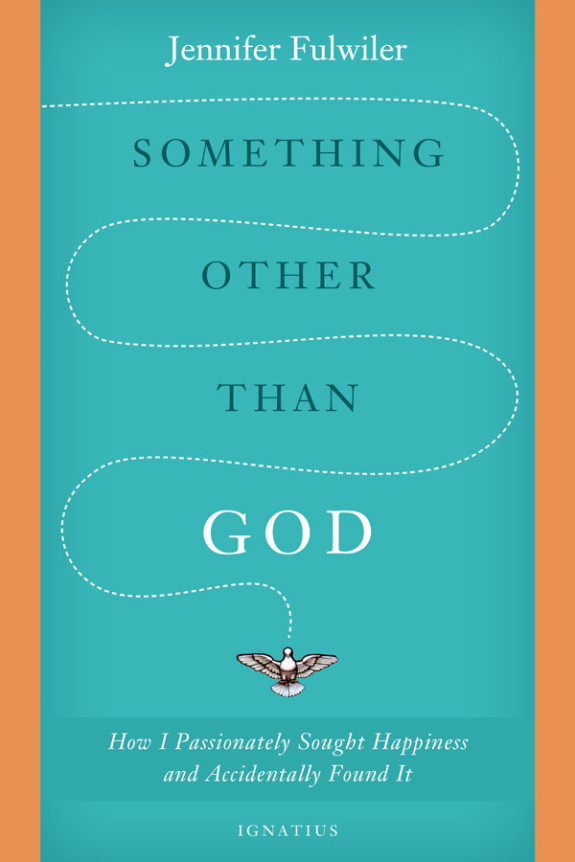One perk of being a book reviewer is that publishers regularly send emails, catalogs, and a steady stream of advanced review copies.
I try to review as many as I can, but I can’t get to them all. So each month I highlight a few new and upcoming books that I’m particularly excited about.
(The descriptions below are either from the publisher or from Amazon.)
Something Other Than God: How I Passionately Sought Happiness and Accidentally Found It
by Jennifer Fulwiler
Ignatius Press, 256 pages, hardcover
Released on April 29, 2014
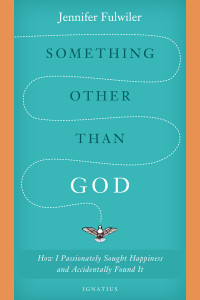 Jennifer Fulwiler told herself she was happy. Why wouldn’t she be? She made good money as a programmer at a hot tech start-up, had just married a guy with a stack of Ivy League degrees, and lived in a twenty-first-floor condo where she could sip sauvignon blanc while watching the sun set behind the hills of Austin.
Jennifer Fulwiler told herself she was happy. Why wouldn’t she be? She made good money as a programmer at a hot tech start-up, had just married a guy with a stack of Ivy League degrees, and lived in a twenty-first-floor condo where she could sip sauvignon blanc while watching the sun set behind the hills of Austin.
Raised in a happy, atheist home, Jennifer had the freedom to think for herself and play by her own rules. Yet a creeping darkness followed her all of her life. Finally, one winter night, it drove her to the edge of her balcony, making her ask once and for all why anything mattered. At that moment everything she knew and believed was shattered.
Asking the unflinching questions about life and death, good and evil, led Jennifer to Christianity, the religion she had reviled since she was an awkward, skeptical child growing up in the Bible Belt. Mortified by this turn of events, she hid her quest from everyone except her husband, concealing religious books in opaque bags as if they were porn and locking herself in public bathroom stalls to read the Bible.
Just when Jennifer had a profound epiphany that gave her the courage to convert, she was diagnosed with a life-threatening medical condition-and the only treatment was directly at odds with the doctrines of her new-found faith. Something Other Than God is a poignant, profound and often funny tale of one woman who set out to find the meaning of life and discovered that true happiness sometimes requires losing it all.
(BONUS: When you pre-order the book before April 28, Jennifer will send you a free 100+ page eBook.)
The Church of Mercy
by Pope Francis
Loyola Press, 200 pages, paperback
Released on April 20, 2014
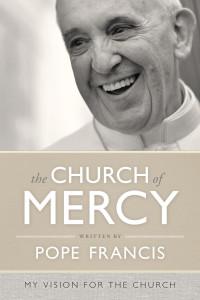 In the year since he was elected, Pope Francis’s simple message of mercy, service, and renewal has spread to every corner of the world. Through his gentle demeanor, selfless actions, and welcoming call for service to others, Pope Francis has captured the attention of a world longing for an authentic message of hope—we want to hear what he has to say.
In the year since he was elected, Pope Francis’s simple message of mercy, service, and renewal has spread to every corner of the world. Through his gentle demeanor, selfless actions, and welcoming call for service to others, Pope Francis has captured the attention of a world longing for an authentic message of hope—we want to hear what he has to say.
Collected from Pope Francis’s speeches, homilies, and papers presented during the first year of his papacy, The Church of Mercyis the first Vatican-authorized book detailing his vision for the Catholic Church. From how to be citizens of the world to answering God’s call for evangelization, Pope Francis’s deep wisdom reminds us that the Church must move beyond its own walls and joyfully bring God’s mercy wherever suffering, division, or injustice exists.
Named TIME Magazine’s 2013 “Person of the Year,” Pope Francis is helping the Church continue toward an authentic Christianity that is faithful to the Gospel and resonant with the world’s greatest needs. The Church of Mercy encourages each of us to ignite the flame within to help share the light of Christ and revitalize the Church.
Angels and Saints: A Biblical Guide to Friendship with God’s Holy Ones
by Scott Hahn
Image Books, 208 pages, hardcover
Released on May 27, 2014
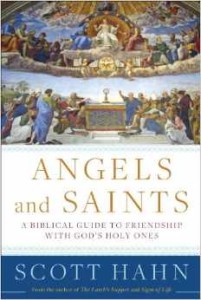 Angels and saints. Catholics tend to think of them as different from the rest of us. They’re cast in plaster or simpering on a holy card, performing miracles with superhero strength, or playing a harp in highest heaven.
Angels and saints. Catholics tend to think of them as different from the rest of us. They’re cast in plaster or simpering on a holy card, performing miracles with superhero strength, or playing a harp in highest heaven.
Yet they are very near to us in every way. In this lively book, Scott Hahn dispels the false notions and urban legends people use to keep the saints at a safe distance. The truth is that Jesus Christ has united heaven and earth in a close communion. Drawing deeply from Scripture, Dr. Hahn shows that the hosts of heaven surround the earthly Church as a “great cloud of witnesses.” The martyrs cry out from heaven’s altar begging for justice on the earth. The prayers of the saints and angels rise to God, in the Book of Revelation, like the sweet aroma of incense.
Dr. Hahn tells the stories of several saints (and several angels too) in a way that’s fresh and new. The saints are spiritual giants but with flesh-and-blood reality. They have strong, holy ambitions—and powerful temptations and opposition that must be overcome. Their stories are amazing and yet familiar enough to motivate us to live more beautiful lives. In this telling of their story, the saints are neither otherworldly nor this-worldly. They exemplify the integrated life that every Christian is called to live.
Still, their lives are as different from one another as human lives can be. Dr. Hahn shows the heavenly Church in all its kaleidoscopic diversity—from Moses to Mary, Augustine to Therese, and the first century to the last century.
Only saints will live in heaven. We need to be more like the saints if we want to live in heaven someday. Dr. Hahn shows us that our heavenly life can begin now.
Made for Love, Loved by God
by Fr. Peter John Cameron O.P.
Servant Books, 160 pages, paperback
Released on May 6, 2014
 A down-to-earth, practical reflection on the nature of God s love, eloquently written by Fr. Peter Cameron. Drawing heavily on Sacred Scripture and the transforming encounters with Jesus Christ recorded in the Gospels, Fr. Cameron seeks to make God s love as real, concrete, and accessible to his readers lives as possible. He emphasizes how God constantly searches for us and takes the initiative in loving us—how he woos us into happiness with him.
A down-to-earth, practical reflection on the nature of God s love, eloquently written by Fr. Peter Cameron. Drawing heavily on Sacred Scripture and the transforming encounters with Jesus Christ recorded in the Gospels, Fr. Cameron seeks to make God s love as real, concrete, and accessible to his readers lives as possible. He emphasizes how God constantly searches for us and takes the initiative in loving us—how he woos us into happiness with him.
Made for Love, Loved by God will also address common misconceptions about God s love as well as the obstacles that prevent us from letting God love us. After reading this book, the reader will feel closer to God by being shown a way to be closer to God. It will imbue the reader with the certainty of the psalmist: “The Lord delights in those who wait for his love (Psalm 147:11).
Cybertheology: Thinking Christianity in the Era of the Internet
by Antonio Spadaro
Fordham University Press, 172 pages, paperback
Released on June 5, 2014
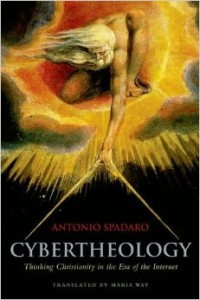 This book, written by Antonio Spadaro, S.J., the Editor of La Civiltà Cattolica, has been translated by Maria Way, who specializes in topics relating to media and religion. The author suggests that since the Internet has changed, and is changing, the ways in which we think and act, it must also be changing the ways in which we think Christianity and its theology. To develop this theme, he uses the term ‘Cybertheology’.
This book, written by Antonio Spadaro, S.J., the Editor of La Civiltà Cattolica, has been translated by Maria Way, who specializes in topics relating to media and religion. The author suggests that since the Internet has changed, and is changing, the ways in which we think and act, it must also be changing the ways in which we think Christianity and its theology. To develop this theme, he uses the term ‘Cybertheology’.
Through the theoretical works of a variety of authors, e.g., Marshall McLuhan, Peter Lévy and Teilhard de Chardin, he associates the concepts of theology with theories that have been expounded on the internet. His sources come from media studies and anthropology, as well as theology. Spadaro also considers the hacker ethic in relation to Cybertheology. How has the internet changed our notion of theology? Has the internet had similar effects on the thinking of Christianity that were experienced after the development of other media technologies?
The book aims to clarify just how thinking has changed or remained the same in an era which is often seen as one in which the media’s changes have speeded up. It considers both the positives and negatives that may be associated with the internet in relation to Christianity and its theology.
Paul in the Summa Theologiae
by Matthew Levering
The Catholic University of America Press, 336 pages, hardcover
Released on April 25, 2014
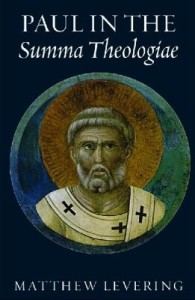 Aquinas’s commentaries on St. Paul are well known and have received significant attention in the past few years. It is widely known, too, that Aquinas quotes Paul often in the Summa theologiae. This aspect of the Summa, however, has not been studied in detail. This book seeks to fill that lacuna in scholarship.
Aquinas’s commentaries on St. Paul are well known and have received significant attention in the past few years. It is widely known, too, that Aquinas quotes Paul often in the Summa theologiae. This aspect of the Summa, however, has not been studied in detail. This book seeks to fill that lacuna in scholarship.
The book’s brief introduction treats Aquinas as a biblically erudite theologian, and offers some basic statistical data regarding his use of Paul in the Summa theologiae. The book’s nine chapters track in detail Aquinas’s use of Pauline quotations in his theological argumentation. The first six chapters examine Paul in particular “treatises:” the triune God, grace, charity, the virtue of religion, the Passion of Christ, and baptism. The last three chapters investigate Pauline texts as they are used throughout the Summa: Romans 1:20, 1 Corinthians 13, and Philippians 2:5–11. Chapters 1–3 are organized by the order of the treatise; chapters 4–6 are organized by order of the Pauline letters.
This multi-faceted procedure provides a rich, detailed picture of Aquinas’s use of Paul in the Summa. The guiding question is whether, and if so how, we can describe Aquinas’s theology as Pauline or as deeply influenced by Paul. Aquinas does not seek to understand Paul’s theology in its Second Temple context, and Aquinas often uses Pauline texts in a way that takes them out of context or that uses them in response to a theological problem unknown to Paul. Levering argues that Aquinas’s theology is indeed deeply Pauline, offering ample evidence that Aquinas captures the central Pauline themes and gives them a central place in his own theology.
What new and notable books are you looking forward to?

